June 4, 2025 | 17:37 GMT +7
June 4, 2025 | 17:37 GMT +7
Hotline: 0913.378.918
June 4, 2025 | 17:37 GMT +7
Hotline: 0913.378.918
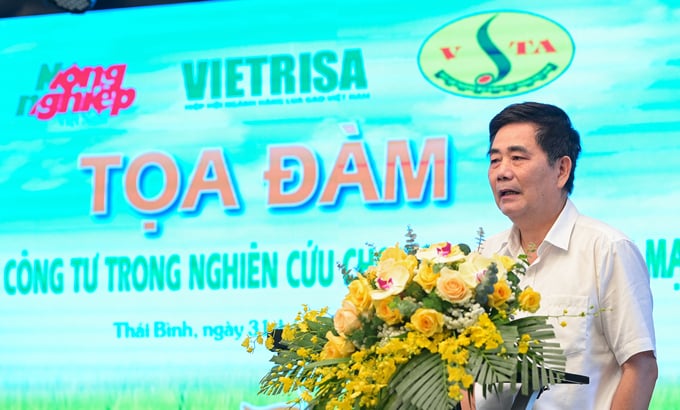
Mr. Cao Duc Phat, former Minister of Agriculture and Rural Development, Chairman of the Board of Directors of IRRI spoke at the seminar. Photo: Tung Dinh.
During the seminar "Connecting and Public-Private Cooperation in Rice Variety Research and Commercialization," organized by the Vietnam Food Association, the Vietnam Seed Trade Association, and Vietnam Agriculture Newspaper on May 31, Mr. Cao Duc Phat, former Minister of Agriculture and Rural Development, and Chairman of the Board of Directors of the International Rice Research Institute (IRRI), evaluated Vietnam's seed industry, specifically rice varieties, as having made substantial achievements and effectively disseminated these accomplishments to farmers.
Mr. Phat emphasized that public-private cooperation is not merely a single aspect, but rather an interconnected series of elements, as he discussed the seminar's theme. "While acknowledging the improvements and achievements in the chain's operations, the former Minister of Agriculture and Rural Development emphasized the need to address remaining bottlenecks in order to enhance its seamlessness."
Therefore, by enhancing collaboration, the process becomes more efficient and smooth, leading to accelerated scientific advancements and successful integration into daily life. This, in turn, generates incentives to drive further research.
Therefore, it is imperative for public scientific institutions to promptly and explicitly communicate updated knowledge to enterprises, enabling them to make informed decisions. In addition, it is necessary for them to stay updated on global trends and adhere to international standards.
The Chairman of the Board of Directors of IRRI identified two prevailing challenges in the field of agriculture, thereby establishing guidelines for collaboration between the public and commercial sectors in the upcoming phase. Urbanization and industrialization will result in an increase in urban populations with higher incomes, thereby leading to a greater demand for high-quality rice.
Furthermore, the profitability of rice farming will diminish, causing a significant number of farmers to forsake their crops and lands. Hence, the present task is to guarantee that the rice industry and rice farmers attain augmented revenues in order to sustain rice cultivation.
The second issue is climate change. According to Mr. Phat, climate change is real, and it is necessary to ensure that the rice industry adapts to these changes. "How can rice plants stand firm in the fields in all situations, be productive, of good quality, and also reduce emissions," Mr. Phat raised the issue.
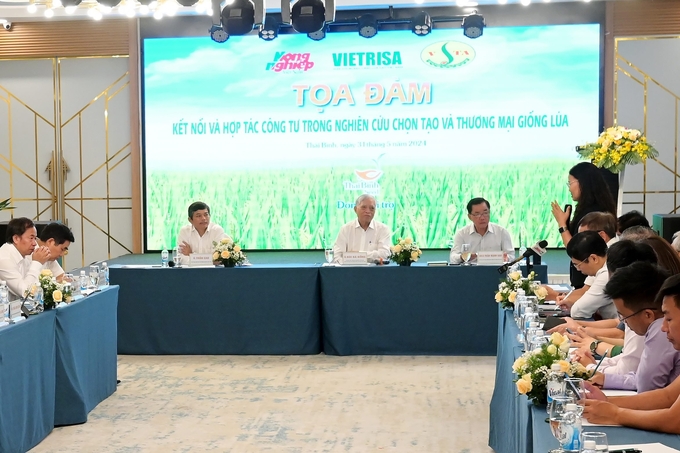
Mr. Bui Ba Bong (middle), Chairman of Vietnam Rice Industry Association (VIETRISA), Mr. Tran Manh Bao (right), Chairman of Vietnam Seed Trade Association (VSTA) and Mr. Tran Cao , Deputy Editor-in-Chief of Vietnam Agriculture Newspaper moderated the forum. Photo: Tung Dinh.
Mr. Cao Duc Phat suggested two options to address these requirements: modifying nutrition to align with customer preferences and enhancing sustainability by decreasing greenhouse gas emissions. This may be achieved by limiting the growing duration of rice plants, reducing emissions.
At IRRI, the organization is researching genetically modified rice types with a low Glycemic Index (GI) below 50, specifically targeting individuals with diabetes or those at risk of developing the condition. "IRRI has identified the gene responsible for regulating this characteristic and can modify it, resulting in all rice varieties having a low glycemic index," stated Mr. Cao Duc Phat. He further mentioned that the current market price for this rice is $1,800 per ton, in contrast to conventional rice which is priced at over $500 per ton.
Mr. Phat suggests that rice with cancer-preventing characteristics or high protein content should be considered a potential research direction in addition to having a low glycemic index (GI).
The second strategic focus identified by the IRRI leadership involves doing research to enhance the sustainability of the rice sector. This includes efforts to enhance the resistance of rice varieties to challenges such as drought, salinity, and waterlogging, as well as other desirable traits that can be exploited.
"The use of gene-editing technology to produce different types of organisms raises the question of whether these organisms can be classified as genetically modified organisms (GMOs)." Mr. Cao Duc Phat emphasized the necessity of doing precise studies to ensure these organisms are not genetically modified. Once this confirmation is obtained, it is important to distribute this knowledge both nationally and internationally publicly.
Mr. Phat stated that IRRI now holds a collection of 132,000 different types of rice and has recently been granted funding of over USD 2 million from Google to develop AI technology to classify and describe these rice varieties.
Businesses have the ability to describe the specific properties they require in a rice variety, and artificial intelligence (AI) will then filter and recommend varieties that possess the desired characteristics. By leveraging technology, IRRI has implemented a streamlined procedure for rapid breeding and development of new varieties, significantly reducing the time required from eight years to a mere two years. Vietnam can adopt and adapt this approach to expedite its own processes.
Translated by Linh Linh
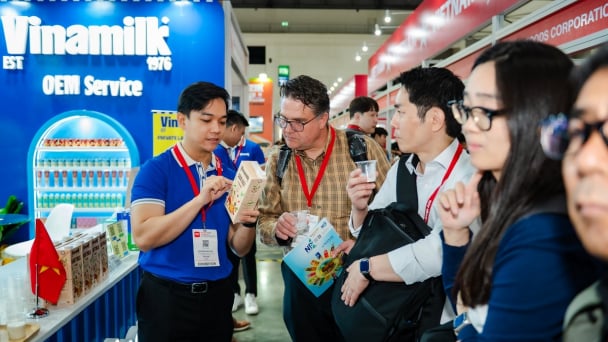
(VAN) At Thaifex Anuga Asia 2025, Asia’s leading food and beverage trade show, more than 170 Vietnamese enterprises are participating, with Vinamilk having been a consistent presence for nearly 20 years.
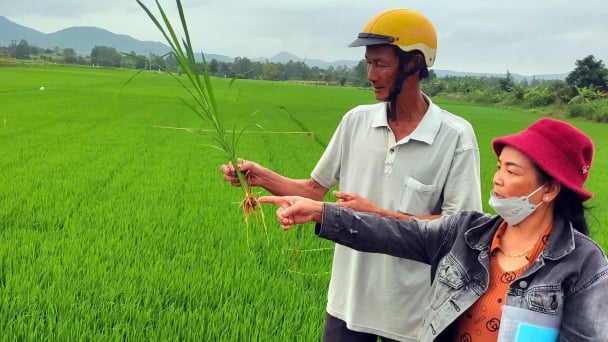
(VAN) On June 3, the Institute of Agricultural Environment organized a workshop titled 'Supporting greenhouse gas inventories in agriculture: Enhancing technical and governance insights for rice production in Vietnam'.
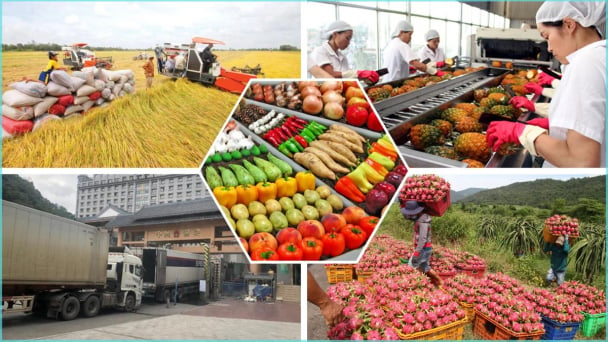
(VAN) In the first 5 months, the export turnover of agricultural, forestry, and fishery products rise significantly, thanks to a relatively stable domestic production and export market.

(VAN) Deposit Return System (DRS) created a natural cycle of responsibility, reinforced by social norms and practical necessity. Materials had value and returning them was second nature.

(VAN) According to the Norwegian Ambassador to Vietnam Hilde Solbakken, sorting waste at source and individual responsibility are key factors for sustainable waste management.
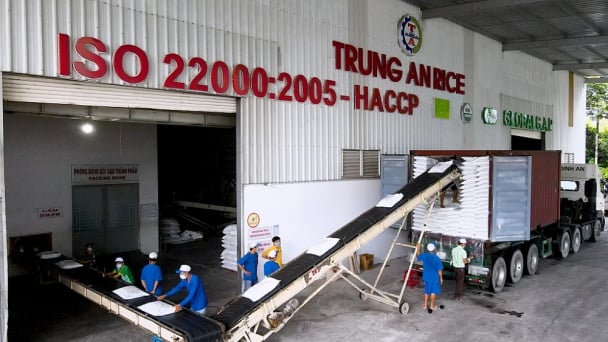
(VAN) On June 5, in Can Tho City, the Vietnam Rice Industry Association (VIETRISA) and Trung An Company will hold a ceremony to export the first shipment of 'Green and Low-Emission Vietnam Rice' to Japan.
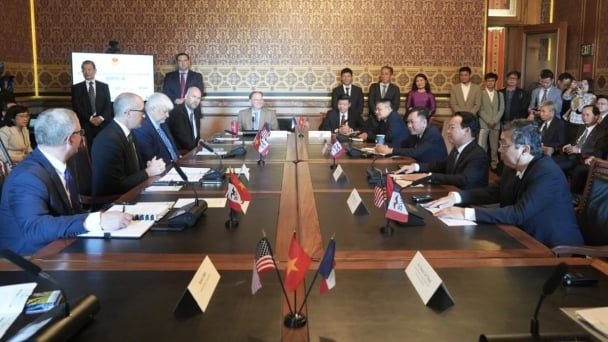
(VAN) Minister Do Duc Duy believes this event will mark the start of a new chapter in deeper cooperation between Vietnam’s agricultural sector and the state of Iowa.